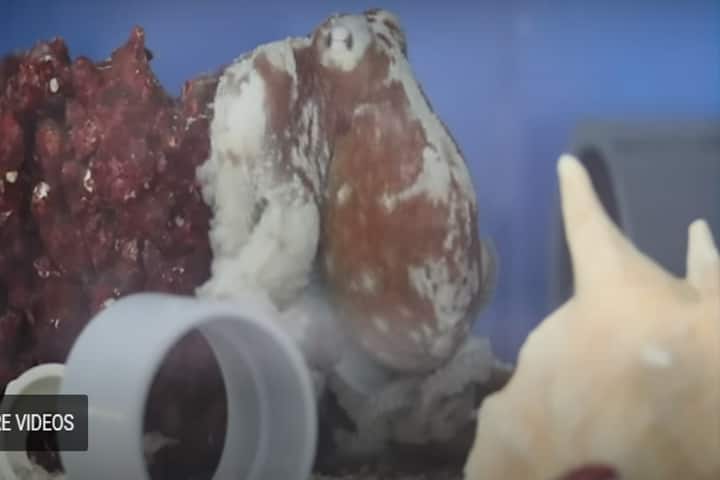

Screengrab from the video that filmed Costello, the octopus getting up from sleep suddenly
Animals continue to surprise us. The latest instance is that of Costello, an octopus who during filming for 24 hours a day for over a month in a laboratory exhibited bizarre and unusual behaviour four times that resembled waking from a dreadful nightmare.
As per a report in sciencealert.com this creature filmed at New York’s The Rockefeller University, on these occasions woke up suddenly and indulged in a behaviour which was anti-predatory and predatory; changed colours and also swung around its arms aimlessly.
Details of what the scientists observed and concluded, which was published in bioRxiv last week stated that in two instances, the animal shot black ink into the water. This act is done to escape predators and interestingly, there was no predator present and researchers feel that it points to temporary distress which suggests response to a bad dream.
Eric Angel Ramos, one of the scientists involved in the study talking to Live Science said: “It was really bizarre, because it looked like he was in pain; it looked like he might have been suffering, for a moment. And then he just got up like nothing had happened, and he resumed his day as normal.”
The octopus on his arrival to the lab seemed to have suffered grievous injuries. This included losing a large part of his two arms. The study noted that in such cases in creatures “can result in long-term behavioural and neural hypersensitivity”. The bizarre acts on part of Costello may have been his response to memories of the attack.
Even though the research has not been peer-reviewed so far and recorded only in one octopus, it does raise questions about the possibility of dream-like experiences in these creatures who are highly intelligent.
Conclusive determination of dreaming is not possible, said Marcelo Magnasco, the study’s co-author. “Where do you put electrodes on an animal that has no shape?” Magnasco told New Scientist.
A 2021 study by scientists discussing octopuses’ sleep had found proof of human-like sleep cycle. They discovered a fluctuation in skin colour of the animals which was similar to the rapid eye movement period of human sleep. REM is the phase when dreams occur.
Robyn Crook, Associate Professor of biology at San Francisco State University not part of the study offered another explanation. She told Live Science that the behaviour of octopus could be ascribed to senescence – the breaking of the body before death. Incidentally, Costello died shortly after these episodes.
Explaining it further, Crook said that his movements in the video may have been caused due lack of motor control which points to senescence.
Co-author Ramos told Live Science: “I don’t exclude that senescence could be one of the drivers of this.”
The researchers did agree that the result of their study cannot be considered conclusive until replicated.
Amid escalating tensions between Israel and Iran, US President Donald Trump on Monday (local time)…
Union Minister of Ports, Shipping and Waterways, Sarbananda Sonowal, said on Monday that the number…
The inhabitants of Pakistan-occupied Jammu and Kashmir (PoJK) have been enduring years of neglect as…
The Defence Research and Development Organisation (DRDO) is set to make a significant impact at…
Cyprus President Nikos Christodoulides and Prime Minister Narendra Modi on Monday viewed the mountains near…
Cyprus President Nikos Christodoulides said he and Prime Minister Narendra Modi discussed expanding bilateral ties…